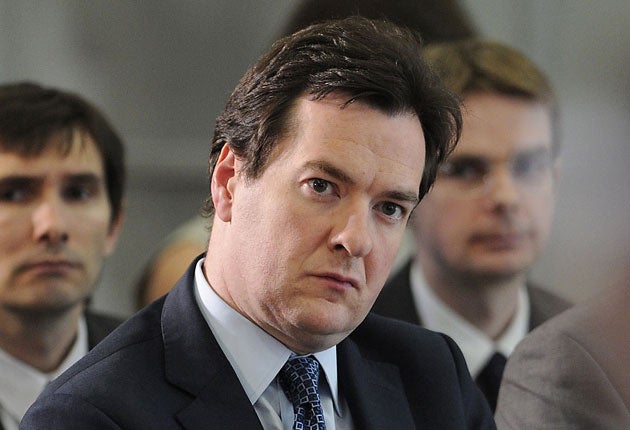IMF backs Osborne's strategy – but warns tax cuts may be needed

The International Monetary Fund yesterday delivered a powerful endorsement of the Chancellor's strategy to reduce government borrowing – but warned that ministers may need to cut taxes and the Bank of England will have to inject more money into he economy if "major risks materialise". This is the nearest that any international body has come to suggesting a "Plan B" may be needed. The level of unemployment in Britain is, the IMF added, "unacceptable", and it also pointed to inflation and the fragility of the banks as "significant risks".
British economic growth this year, says the IMF, will be 1.5 per cent, down from an estimate of 1.7 per cent in April. For 2012, the IMF is expecting 2.25 per cent to 2.5 per cent growth, a little below the last projection from the UK's own Office for Budget Responsibility.
Nonetheless, the acting managing director of the IMF, John Lipsky declared: "We're pleased the UK is showing global leadership on the economy." The Fund reiterated its view that "strong fiscal consolidation is underway and remains essential." In language that could have been penned by the Treasury's own spin doctors, the IMF's latest assessment of the UK economy concluded that: "The current settings of fiscal and monetary policy remain appropriate in the central scenario. Such a policy mix will support economic rebalancing to a more sustainable equilibrium."
Speaking earlier in the day, the Chancellor said deficit reduction was "the rock" on which stability would be constructed, and agreed that the Government would allow borrowing to rise "cyclically" if the economy weakens: "We have flexibility built into our plan. But what our plan provides is credibility where there was no credibility, stability where there was no stability, confidence that actually the British economy is getting its act together."
In his March Budget, the Chancellor pencilled in a further £46bn of such borrowing over the next few years in the light of higher inflation and lower growth than had been anticipated, and this may yet go higher. The Government says that, whatever the ups and downs of such "cyclical" movements, it remains determined to tackle the "underlying" or "structural" deficit – the part of government borrowing that will not disappear when the economy returns to normal levels of growth.
The IMF verdict will be especially welcome to George Osborne, coming after widespread coverage of the objections to his policy from a group of academic economists who claimed it was "damaging" growth. Answering questions from reporters, Mr Lipsky rejected that term as "loaded". The Fund's team acknowledged that the cuts in public spending and tax hikes would create "headwinds", but that the effort would have a positive impact in restraining inflation and placing the e public finances on a more sustainable long-term footing, thus "bolstering confidence". Mr Lipsky stressed that the UK's public spending remained very high by historical standards.
Nonetheless the IMF did, for the first time, suggest an alternative policy if "the economy experiences a prolonged period of weak growth and high unemployment". Temporary tax cuts, they argue, should be "targeted to investment, low-income households, or job creation".
There was little in the IMF's report to support the argument of Shadow Chancellor Ed Balls that the Government has been cutting public spending too hard and too fast, and even if the economy stumbles, the IMF prefers tax cuts to postponing public expenditure cuts, as Mr Balls has advocated.
Mr Balls has made much in recent weeks of the slow pace of recovery and the economy has flatlined since last autumn. Disappointing shop sales and car registration figures yesterday confirmed the gloomy picture on consumer spending. Yet the Fund concludes: "The weakness in economic growth and rise in inflation over the last several months was unexpected. This raises the question whether it is time to adjust macroeconomic policies. The answer is no as the deviations are largely temporary." Mr Lipsky also expressed confidence about private sector job growth and business investment.
Mr Balls commented: "Nobody will be surprised that the IMF has decided to reaffirm its backing for the Government's policies at this very sensitive time. But the Chancellor should not take too much comfort from the report. The IMF has warned that there are significant risks to inflation, growth and unemployment."
Safe hands at the IMF tiller
* London's hotel chambermaids, female members of the IMF staff and indeed the Chancellor of the Exchequer's policies all have little to fear from John Lipsky, the Fund's 64-year-old acting head, writes Sean O'Grady.
Apart from his luxuriant trademark moustache, which gives him the appearance of an Edwardian male model, the American Mr Lipsky is an IMF "lifer", and the very model of a grey international monetary statesman. In the press conference yesterday he successfully neutered the best efforts of Fleet Street's finest to wrongfoot him and was much too clever for them, veteran as he is of countless bureaucratic skirmishes.
The Fund, and Fund-watchers, will miss Mr Lipsky. He retires this autumn, having stood in for Dominique Strauss-Kahn since his resignation on 18 May. The French Finance minister, Christine Lagarde, is favourite to succeed Mr Lipsky.
Join our commenting forum
Join thought-provoking conversations, follow other Independent readers and see their replies
Comments